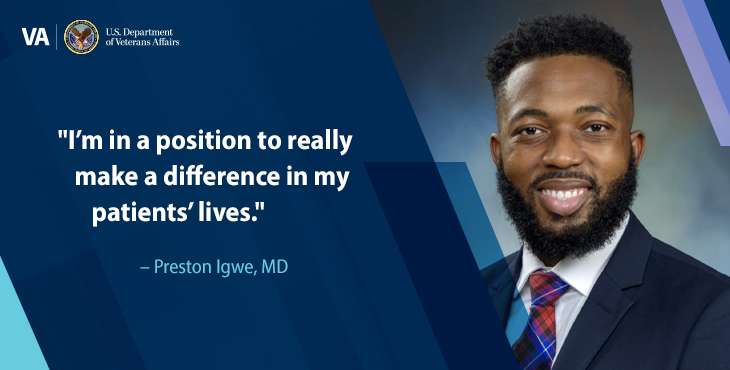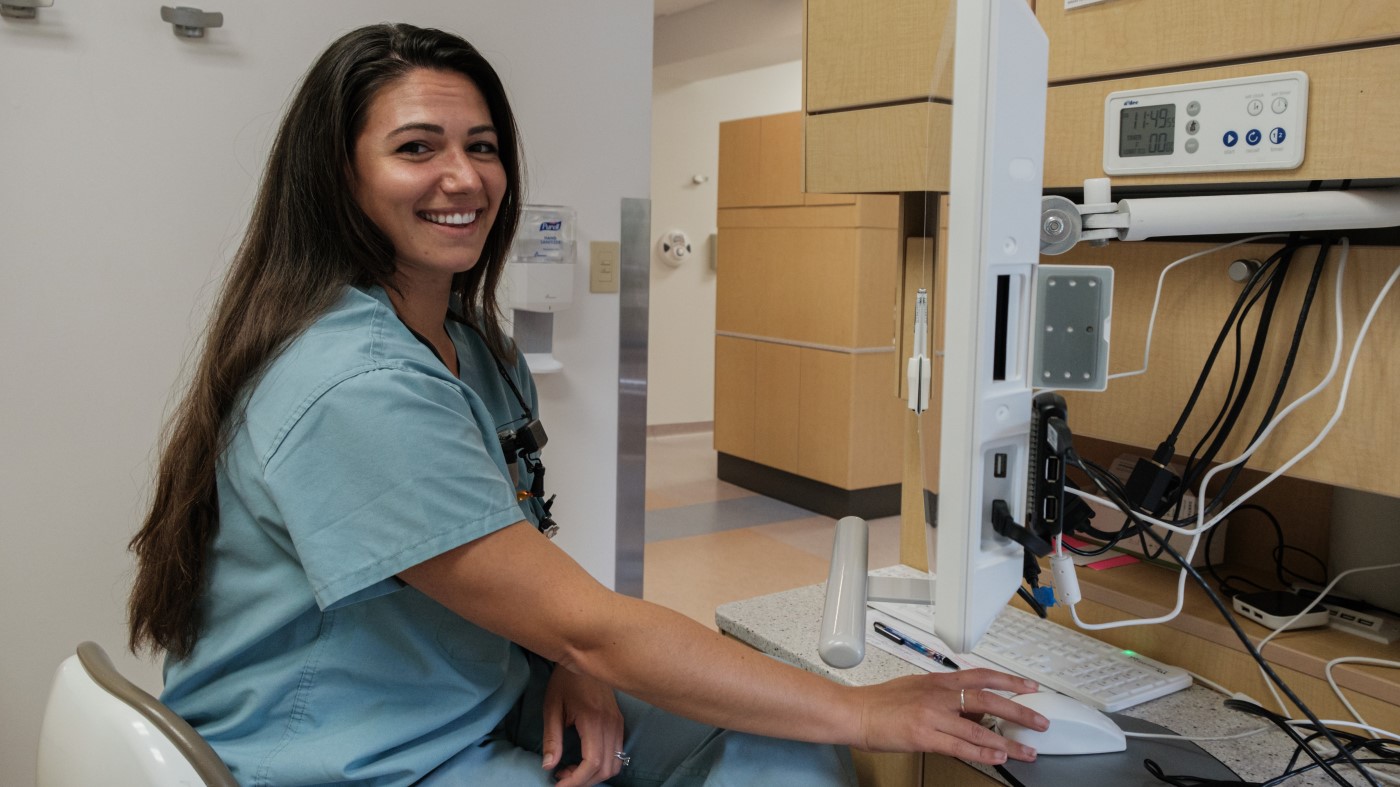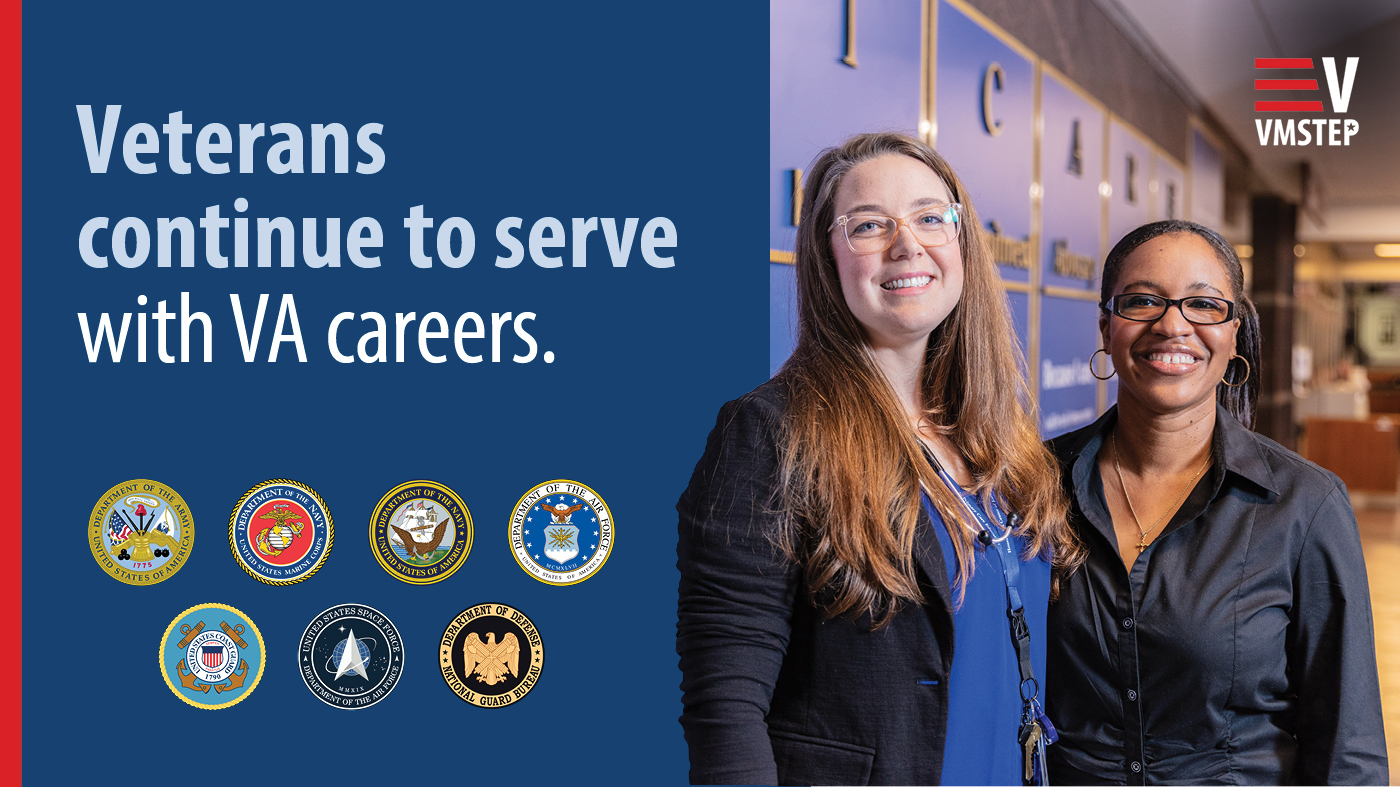As a medical professional, you never know what kind of impact you may have on a patient, as Dr. Preston Igwe, M.D., learned during a rotation at VA.
In a viral tweet from January 2022, Dr. Igwe shared that he was the first Black physician that his patient, a Black Veteran, had seen in his 50 years coming to VA for medical care.
Dr. Igwe, a first-year psychiatry resident who rotates between VA and the Ronald Reagan Medical Center as part of his work at UCLA, recently sat down with us to discuss his career, diversity in medicine and at VA, and that tweet.
What made you first want to become a doctor?
I have wanted to be a doctor since I was a kid growing up in a traditional Nigerian home. I am originally from Nigeria, but my family moved to southwest Houston when I was very young. I went to a diverse high school for students interested in health professions, so I was able to see my classmates striving to go to college and become doctors, dentists, nurses and pharmacists.
After I graduated high school, I had to have a couple of surgeries in college to remove a tumor in my jaw. That was when I saw the patient side of medicine for the first time. That experience further fueled my passion to become a physician, and it allows me to connect with how my patients are feeling.
Did you have previous knowledge of VA prior to joining our team?
UCLA psychiatry residents all spend a lot of time at VA as part of our training. That was something that appealed to me, because it is a very large system and well-integrated nationally. I am a fan of the fact that it functions as a sort of universal health coverage for Veterans who qualify for VA services.
I did not get VA experience as a medical student, so the VA system was very new to me and took some getting used to. Now that I have been working at VA for several months, I am much more comfortable and confident navigating the system.
Prior to the interaction you shared on Twitter, had you ever encountered anything like that?
The best parts of medical school and residency, for me, are the moments where you really feel the difference that your presence makes.
As a Black medical student, there are times where Black patients see you and their faces light up. Many times, they tell you that it’s rare to see a Black medical student or doctor, so it’s very refreshing for them. Often, they tell you to keep pushing forward and that they’re proud of you. Those experiences are priceless!
I’ve never had a patient tell me that I was the first Black doctor that they’ve ever had, though. I’m sure that may have been the reality for several of my patients because only 5% of doctors in America identify as Black. But the patient I saw at VA was the first one to verbalize it so directly.
When that Veteran spoke up, what struck you most, in that moment?
I was struck by the fact that it had been over 50 years and he had never seen a Black doctor at VA. I know that there have been several at VA in that time span, so the fact that he never ran across one was both shocking and disappointing. It shows that there is still a lot of work to be done to diversify both VA and medicine as a whole.
Has that interaction changed the way you look at your work at VA?
Not really. I knew what the statistics were for Black physicians when I started medical school. I still show up to work every day ready to do my best by each and every patient. What it did was highlight the fact that, in regard to diversity in medicine, we have not come as far as some people would like us to believe.
I’m in a position to really make a difference in my patients’ lives. Especially my Black patients, because they might have never seen a doctor that looks like them before. And now I know how life-changing that can be for a patient. It’s a big responsibility, but it’s a privilege at the same time.
When it comes to diversity in the medical profession, and at VA, how would you approach things differently?
I think the field of medicine as a whole needs to focus on more than just increasing the presence of underrepresented racial and ethnic groups. Although that is critically important, medicine also needs to focus on cultivating an environment where these individuals can live happy and healthy lives as medical professionals.
We need to deconstruct the structural barriers that keep people of color out of medicine and address the forces that push us out of the field as well. There are hundreds of years of inequities in medicine, and the field must reckon with that history honestly and transparently while doing its best to eradicate those inequities.
What is VA doing right when it comes to attracting diverse medical professionals?
I think that the debt reduction programs at VA are great for recruiting diverse medical professionals. On average, Black and Latino medical students graduate medical school with larger student loan burdens than our white counterparts, so having a robust program that makes it easier to repay our loans is a great recruiting tool.
What is your favorite thing about working at VA?
I really enjoy working with underserved patients, and I get most of that experience in residency from working at VA. I get to work with many racial and ethnic minorities at VA. I also get to work with patients who are homeless, uninsured and often don’t have anyone in their lives who can help take care of them. I get tremendous satisfaction in taking care of these patients.
What would you tell someone considering a career at VA?
I would tell them that it is a rewarding experience. It is a good way to take care of diverse and underserved patients. You can focus on what’s most important – treating the patient to the best of your ability.
Work at VA
As we serve the most diverse group of Veterans in history, VA is committed to hiring a culturally competent workforce and is working to develop a new mission, goals and objectives regarding diversity, inclusion, equity and access.
- READ about our commitment to diversity.
- LEARN about VA’s efforts toward inclusion.
- EXPLORE our programs and hiring initiatives.
- SEARCH for a VA career near you.
Topics in this story
More Stories
You had questions, we had answers. Take a look at the information and advice we shared that had the most impact with readers in 2024.
For Veterans, the mission does not end when the uniform comes off. VA careers offer opportunities to serve while building fulfilling civilian careers.
Whether it’s access to the great outdoors or a calmer pace in your everyday life, you can find it in rural VA communities around the country.







Thank you for sharing your story Dr. Igwe. I truly enjoyed reading about your experiences at the VA. Diversity and inclusivity are essential to increasing access to great care for minority veterans. As a VA employee, these are experiences that make it worthwhile to come into work and serve. I wish you much success as you complete your residency and look forward to hearing more of your experiences in psychiatry. Thank you!
How about WE stop looking at what color the doctors are and we care about their qualifications… for 3 years my husband was told by the VA that they couldn’t do anything for the pain in his arm / neck from broken bones .. we finally were approved for outside care and within a month surgery happened and his arm is a 1000% better … THE BONES WERE REPAIRED .. the muscle / nerve damage had been done because it was left unattended for so long .. but who knows maybe that will heal one day. (Hopefully) he shouldn’t have had to suffer for that long because the doctors were not qualified to handle his care. We dont care what color the docs are .. as long as they are educated with the skills that can help the vets .. not push them out the door with the standard “nothing can be done to fix that speech” as far as Psychiatric care goes .. the VA is way behind .. we had an emergency situation with PTSD that was triggered by my husband contracting Covid .. I called .. begged and pleaded to the VA to have him placed back on meds until he was stable again .. we were told it would take 3 weeks to get a referral and that his primary wasn’t allowed to reissue his PTSD meds that is could only go through Psychiatrist… well none were available.. the only response we were given through dozens of phone calls were call the 1800 number and “let’s talk about his feelings” as his wife .. I am his battle buddy now .. I know when my husband is good (off psych meds for 3 years no issues) but I also know when things are critical and all the signs are there … we call, we beg for help .. we get nothing but delays … I had to find an outside doctor who would see him under emergency care in order to get him back on meds to be stabilized … thank God we keep the door open with outside docs for emergencies because the VA fails their patients. I understand why Vets are taking their own lives .. the VA brings them home .. dumps them in a system that isn’t equipped to handle their care .. between the long waiting lines to appointments and the hoops just to get the right care .. the Vets break down and lose hope. Sometimes you don’t have 3 weeks to wait … let’s not even discuss dental .. Vets are pumped full of meds that destroy their teeth and unless your 100% disabled you have no dental care. My husband went from a mouth of beautiful teeth to decayed jagged pieces due to most of the meds cause dry mouth. Now we can’t even afford to have his teeth cared for and repaired or even pulled and the VA doesn’t care about that either … they will pay for sex changes that has ZERO to do with military service .. but not basic needs such as dental for those who are in the system and left with side effect destructions.